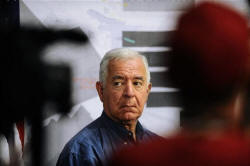|
 Mine disaster highlights politics of coal in W.Va. Mine disaster highlights politics of coal in W.Va.
 Send a link to a friend
Send a link to a friend
[April 20, 2010]
CHARLESTON, W.Va. (AP) -- In southern West Virginia, coal has been king for more than a century. The politicians in these hardscrabble mining towns tread a fine line, trying to balance support for an industry worth billions of dollars and thousands of jobs while also trying to protect workers from its lapses and excesses.
Caption: U.S. Rep. Nick J. Rahall
D-WV, listens during a press conference Thursday, April 8, 2010 at
Marsh Fork Elementary in Montcoal, W.Va. On Monday 25 miners were
killed in an explosion at nearby Massey Energy's Upper Big Branch
Coal Mine in Montcoal, W.Va. (AP Photo/Jeff Gentner)
|
|
 No one feels that tension more these days than U.S. Rep. Nick Rahall, who rushed to the scene after Monday's explosion at the Upper Big Branch mine killed 29 miners in the heart of his native Raleigh County. No one feels that tension more these days than U.S. Rep. Nick Rahall, who rushed to the scene after Monday's explosion at the Upper Big Branch mine killed 29 miners in the heart of his native Raleigh County.
The 17-term Democrat has been criticized for more than a year by people in both parties for what they say is insufficient support of the coal industry, and he faces a challenge in this year's election from a prominent, newly minted Republican who says the incumbent is part of a left-wing "war on coal miners."
That challenger - former state Supreme Court Justice Elliott "Spike" Maynard
- has a long-standing friendship with Don Blankenship, the chief executive of mine owner Massey Energy Co., which faces intense scrutiny and criticism for a history of safety violations at Upper Big Branch.

Maynard, in a primary to face Rahall in the general election, could find his political future affected by his close ties to Blankenship as authorities, the media and workers dissect how and why the explosion happened.
Coal occupies a dominant position in the politics and culture of West Virginia, even as mechanization and less labor-intensive types of mining have reduced the number of workers to roughly a tenth of what there were in the 1950s. Back then, company towns were common and the United Mine Workers of America's annual Labor Day picnic at Racine was a must-attend event for any politician hoping to be elected.
A statue of a coal miner adorns the grounds of the state Capitol, and last year the Legislature voted unanimously to name bituminous coal the official rock of West Virginia, saying the "industry remains essential to economic growth and progress in West Virginia and the United States."
Incurring the wrath of the industry is a risk few politicians are eager to take. Support for a severance tax on coal helped doom the career of Democrat Bill Marland, governor in the early 1950s who ended up driving a cab in Chicago. In 1972, the state's current junior senator, Jay Rockefeller, made ending strip mining part of his campaign for governor. He lost and famously switched his position. He has supported surface mining ever since.

"There is extreme pressure from the industry," said Ken Hechler, a former West Virginia congressman who was the lead sponsor of federal legislation that created what is now the Mine Safety and Health Administration after a 1968 explosion in the town of Farmington that killed 78 miners, including the uncle of current Gov. Joe Manchin.
Hechler said the knot tying coal and politics can only be cut by extraordinary events, including disasters like Farmington and the Upper Big Branch blast. He said the explosion this week will likely mean a new toughness from public officials toward the industry.
"Just as Pearl Harbor destroyed the isolationist movement in this country, so will this accident galvanize state and federal officials," he said.
If Hechler is right, those officials will likely start by scrutinizing Massey, whose polarizing chief has tried several times to strengthen the bonds between his industry and government. Blankenship donated millions to the campaign of state Supreme Court Chief Justice Brent Benjamin, who later refused to remove himself from a case involving Massey, a move that ultimately drew a rebuke in the form of a U.S. Supreme Court ruling.
[to top of second column] |
 In 2006, Blankenship spent millions again in a bid to turn the state House of Delegates from Democratic to Republican control, that time failing almost completely.
Maynard, the would-be challenger to Rahall, has also seen his career determined in part by his friendship with the Massey executive. He lost his seat on the state Supreme Court after finishing third of four in a Democratic primary that largely revolved around his relationship with Blankenship.
Photos surfaced showing the two men on vacation in Monaco and the south of France when Massey had cases before the Supreme Court, and Maynard was trounced, losing every county in Rahall's district except Mingo, where he and Blankenship grew up.
After switching parties, Maynard is now the most prominent of four Republicans seeking to topple Rahall in November. Maynard has made coal central to his campaign, trying to link Rahall with the locally unpopular Obama administration and blaming both for costing miners jobs.
Maynard's sole public comment on the blast was a brief statement to The Associated Press: "This is no time for politics. Pray for our miners and their families."

Rahall, 60, has tried to distance himself from some of the Obama administration's heightened regulation of coal, and has emerged as a leader in the wake of the blast as the debate shifts from government regulation of surface mining to the safety of underground miners.
"People are going to want to know how explosions can be prevented in coal mines," said Jim White, a political science professor at Concord University in Athens. "The debate will revolve around what the state and federal government need to do to better regulate the mines."
Rahall, though, continues to walk the tightrope, faulting aspects of the Upper Big Branch operation while defending the industry that accounts for over 14,400 jobs and pays nearly $859 million in annual wages in his district, which includes the state's poorest counties.
"Coal is the largest generator of electricity in this country, and will be in the foreseeable future and continue to keep the lights on," Rahall told The Associated Press. "Now, is coal a dangerous occupation? Yes. Can we totally, 100 percent eliminate casualties? Unfortunately, no, we haven't found that perfect world yet."
[Associated
Press; By TOM BREEN]
Copyright 2010 The Associated
Press. All rights reserved. This material may not be published,
broadcast, rewritten or redistributed.

 |